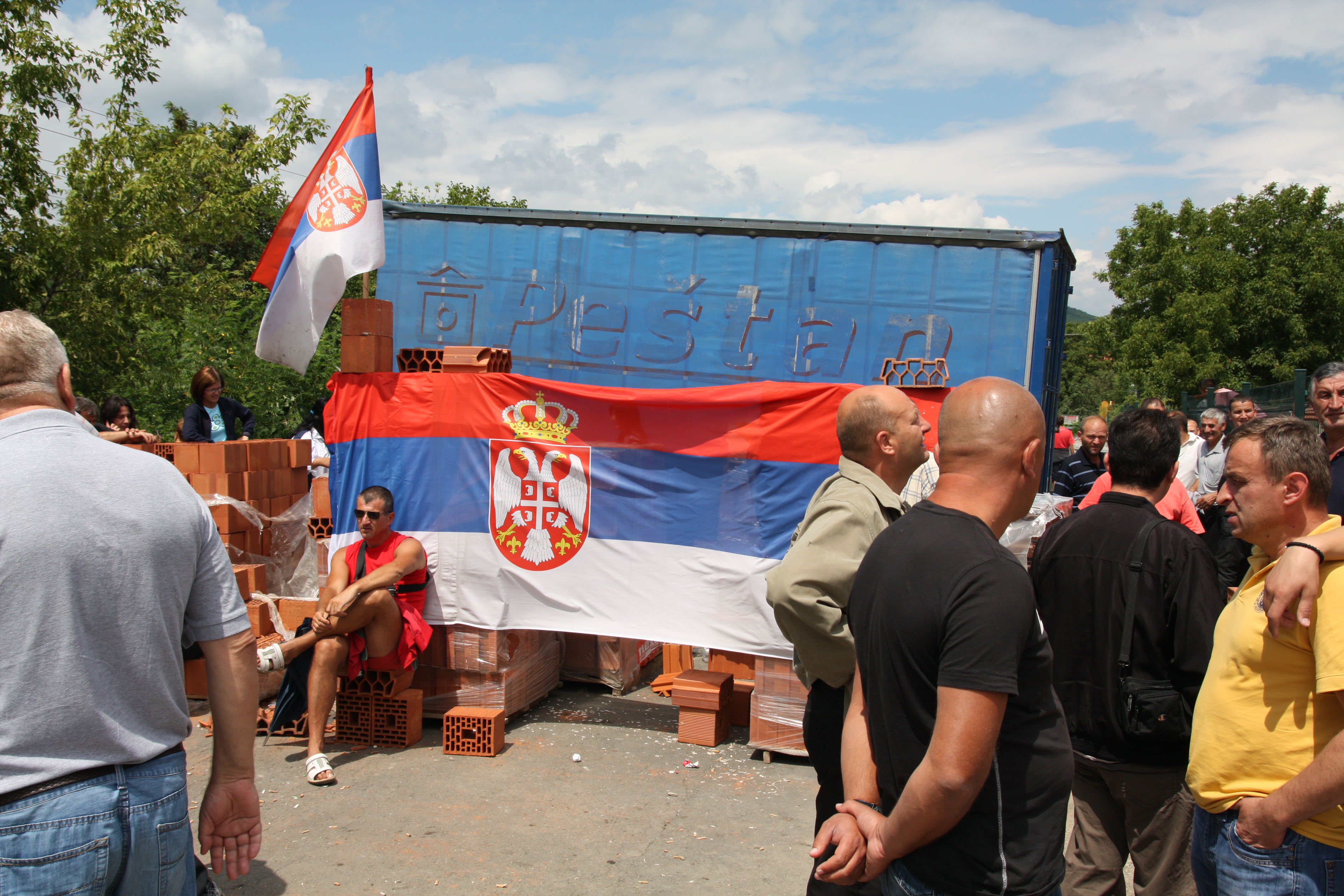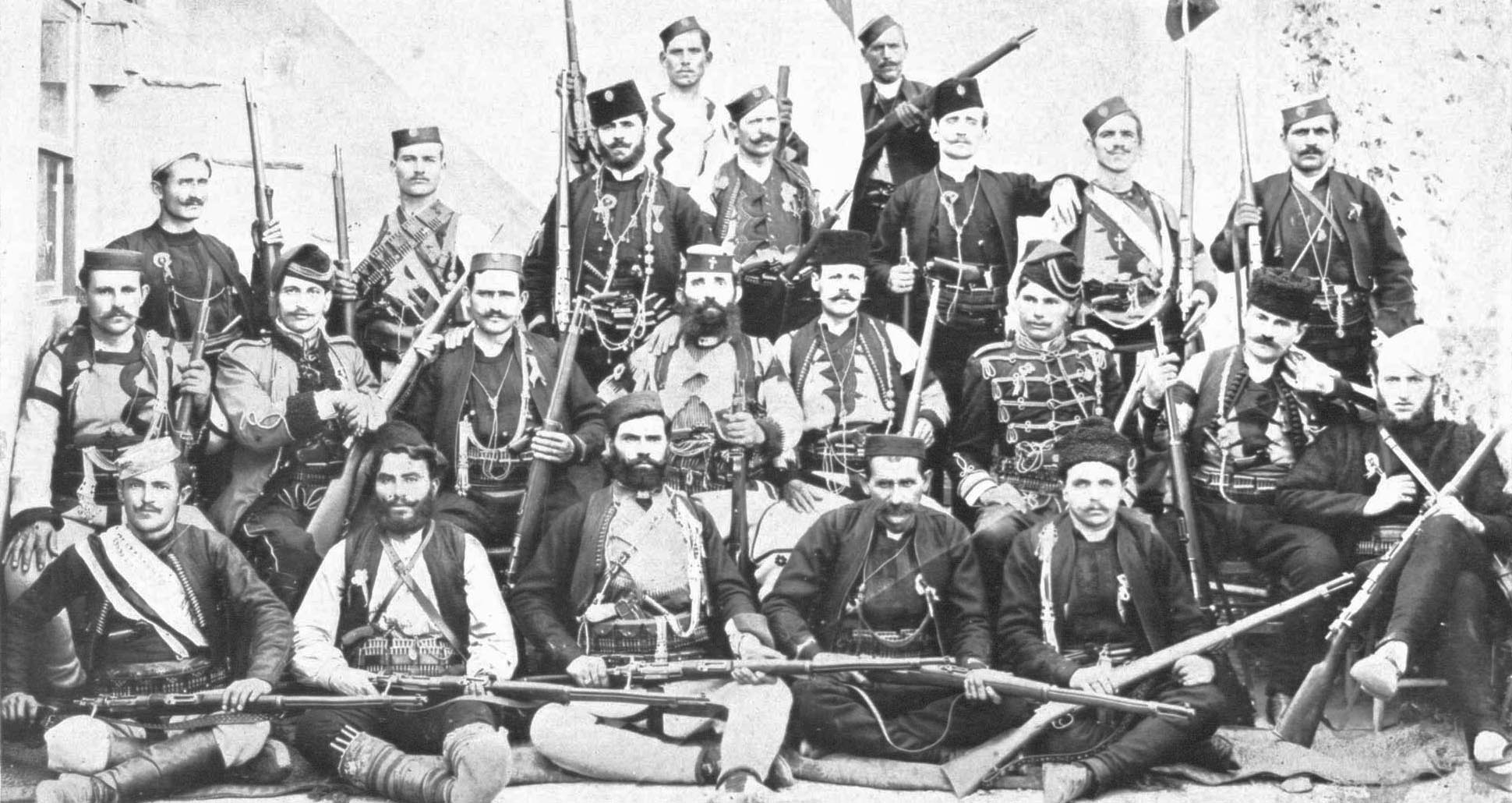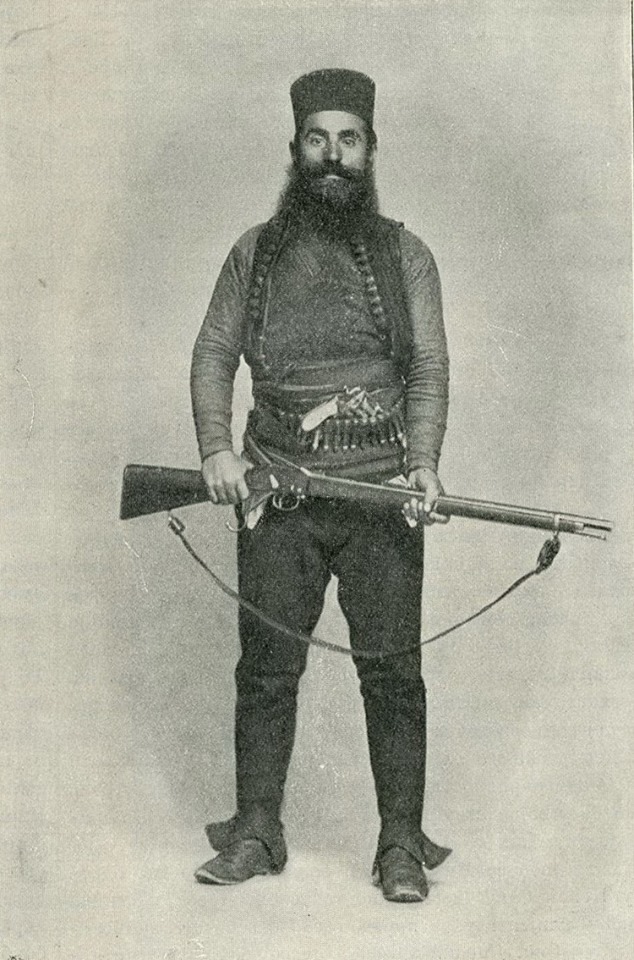|
Vukajlo Božović
Vukajlo Božović ( sr-cyr, Вукајло Божовић; d. 1926), known as Priest Vukajlo (поп Вукајло) was a Serbian Orthodox priest and revolutionary. Božović participated in the Balkan Wars, as a commander of a detachment in Ibarski Kolašin. He was the father of writer Grigorije Božović. First Balkan War During the Serbian mobilization of the First Balkan War, the Chetnik detachments of the Serbian 3rd Army included: ''Medveđa'', colon headed by captain Dušan Sekulić, Ljubomir Vulović and Nikodim Racić (Lisica-Prapaštice-Priština), and colon headed by Božin Simić (Svirci-Novo Brdo-Kačanik); ''Kuršumlija'', under the command of captain and Chetnik vojvoda Vojislav Tankosić and captain Dragutin Nikolić (Kuršumlija-Merdare-Malo Kosovo-Štimlje-Crnoljeva-Prizren-Ljuma); ''Lukovo'', under the command of captain Pavle Blažarić (Lukovo-Madljika-Drenica); and ''Kolašin'', under the command of ''prota'' Vukajlo Božović.Trifunović 1933, pp. 97-98 A ... [...More Info...] [...Related Items...] OR: [Wikipedia] [Google] [Baidu] |
Ibarski Kolašin
North Kosovo ( sr, Северно Косово, Severno Kosovo; sq, Kosova Veriore), also known as the Ibar Kolašin ( sr, Ибарски Колашин, Ibarski Kolašin; sq, Koloshini i Ibrit or ''Kollashini i Ibrit''; earlier ''Old Kolašin'', sr, Стари Колашин, Stari Kolašin; sq, Koloshini i Vjetër or ''Kollashini i Vjetër''), is a region in the northern part of Kosovo, generally understood as a group of four municipalities with ethnic Kosovo Serbs majority: North Mitrovica, Leposavić, Zvečan and Zubin Potok. Prior to the 2013 Brussels Agreement, the region functioned independently from the institutions in Kosovo, as they refused to acknowledge and recognize the independence of Kosovo, declared in 2008. The Government of Kosovo opposed any kind of parallel government for Serbs in this region. However, the parallel structures were all abolished by the Brussels Agreement, signed between the governments of Kosovo and Serbia. Both governments agreed upon ... [...More Info...] [...Related Items...] OR: [Wikipedia] [Google] [Baidu] |
List Of Chetnik Voivodes
This is a list of Chetnik voivodes. VoivodeAlso spelled "voievod", "woiwode", "voivod", "voyvode", "vojvoda", or "woiwod" () ( Old Slavic, literally "war-leader" or "war-lord") is a Slavic as well as Romanian title that originally denoted the principal commander of a military force. It derives from the word ''vojevoda'', which in early Slavic meant the ''bellidux'', i.e. the military commander of an area, but it usually had a greater meaning. Among the first modern-day voivodes was Kole Rašić, a late 19th-century Serb revolutionary and guerrilla fighter, who led a cheta of 300 men between Niš and Leskovac in Ottoman areas during the Serbo-Turkish War (1876–1878). The others were Rista Cvetković-Božinče, Čerkez Ilija, Čakr-paša, and Spiro Crne. Jovan Hadži-Vasiljević, who knew Spiro Crne personally, wrote and published his biography, ''Spiro Crne Golemdžiojski'', in 1933. Commanders of Old Serbia and Macedonia (1903–1912), Balkan Wars * Kosta Milovanović-P ... [...More Info...] [...Related Items...] OR: [Wikipedia] [Google] [Baidu] |
Armed Priests
Throughout history, armed priests or soldier priests have been recorded. Distinguished from military chaplains who served the military or civilians as spiritual guidance (non-combatants), these priests took up arms and fought in conflicts (combatants). The term warrior priests or war priests is usually used for armed priests of the antiquity and Middle Ages, and of historical tribes. History In Greek mythology, the Curetes were identified as armed priests. In Ancient Rome, the Salii who were armed priests carried sacred shields through the city during the March festivals. Livy (59 BC–17 AD) mentions ''armati sacerdotes'' (armed priests). Medieval European canon law said that a priest could not be a soldier, and vice versa. Priests were allowed on the battlefield as chaplains, and could only defend themselves with clubs. The Aztecs had a vanguard of warrior priests who carried deity banners and made sacrifices on the battlefield. The warrior-priest was a common figure in the F ... [...More Info...] [...Related Items...] OR: [Wikipedia] [Google] [Baidu] |
Serbian Orthodox Clergy
Serbian may refer to: * someone or something related to Serbia, a country in Southeastern Europe * someone or something related to the Serbs, a South Slavic people * Serbian language * Serbian names See also * * * Old Serbian (other) * Serbians * Serbia (other) * Names of the Serbs and Serbia Names of the Serbs and Serbia are terms and other designations referring to general terminology and nomenclature on the Serbs ( sr, Срби, Srbi, ) and Serbia ( sr, Србија/Srbija, ). Throughout history, various endonyms and exonyms have bee ... {{Disambiguation Language and nationality disambiguation pages ... [...More Info...] [...Related Items...] OR: [Wikipedia] [Google] [Baidu] |
Chetniks
The Chetniks ( sh-Cyrl-Latn, Четници, Četnici, ; sl, Četniki), formally the Chetnik Detachments of the Yugoslav Army, and also the Yugoslav Army in the Homeland and the Ravna Gora Movement, was a Yugoslav royalist and Serbian nationalist movement and guerrilla force in Axis-occupied Yugoslavia. Although it was not a homogeneous movement, it was led by Draža Mihailović. While it was anti-Axis in its long-term goals and engaged in marginal resistance activities for limited periods, it also engaged in tactical or selective collaboration with the occupying forces for almost all of the war. The Chetnik movement adopted a policy of collaboration with regard to the Axis, and engaged in cooperation to one degree or another by establishing '' modus vivendi'' or operating as "legalised" auxiliary forces under Axis control. Over a period of time, and in different parts of the country, the movement was progressively drawn into collaboration agreements: first with the puppet G ... [...More Info...] [...Related Items...] OR: [Wikipedia] [Google] [Baidu] |
Kosovo Serbs
Kosovo Serbs are one of the ethnic groups of Kosovo. There are around 100,000 Kosovo Serbs as of 2014 and about half of them live in North Kosovo. Other Serb communities live in southern Kosovo. After Albanians, they form the largest ethnic community in Kosovo (4-7%). The medieval Kingdom of Serbia (1217–1346) and the Serbian Empire (1346–1371) included parts of the territory of Kosovo until its annexation by the Ottomans following the Battle of Kosovo (1389), considered one of the most notable events of Serbian history. Afterwards, it was a part of the Serbian Despotate. Modern Serbian historiography considers Kosovo in this period to be the political, religious and cultural core of the medieval Serbian state. In the Ottoman period (1455-1913), the situation of the Serbian population in Kosovo went through different phases. In the 16th century, the Serbian Patriarchate of Peć was re-established and its status strengthened. At the end of 18th century, the support of the P ... [...More Info...] [...Related Items...] OR: [Wikipedia] [Google] [Baidu] |
Military Personnel From Mitrovica, Kosovo
A military, also known collectively as armed forces, is a heavily armed, highly organized force primarily intended for warfare. It is typically authorized and maintained by a sovereign state, with its members identifiable by their distinct military uniform. It may consist of one or more military branches such as an army, navy, air force, space force, marines, or coast guard. The main task of the military is usually defined as defence of the state and its interests against external armed threats. In broad usage, the terms ''armed forces'' and ''military'' are often treated as synonymous, although in technical usage a distinction is sometimes made in which a country's armed forces may include both its military and other paramilitary forces. There are various forms of irregular military forces, not belonging to a recognized state; though they share many attributes with regular military forces, they are less often referred to as simply ''military''. A nation's military may ... [...More Info...] [...Related Items...] OR: [Wikipedia] [Google] [Baidu] |
People From Zubin Potok
A person ( : people) is a being that has certain capacities or attributes such as reason, morality, consciousness or self-consciousness, and being a part of a culturally established form of social relations such as kinship, ownership of property, or legal responsibility. The defining features of personhood and, consequently, what makes a person count as a person, differ widely among cultures and contexts. In addition to the question of personhood, of what makes a being count as a person to begin with, there are further questions about personal identity and self: both about what makes any particular person that particular person instead of another, and about what makes a person at one time the same person as they were or will be at another time despite any intervening changes. The plural form "people" is often used to refer to an entire nation or ethnic group (as in "a people"), and this was the original meaning of the word; it subsequently acquired its use as a plural form of per ... [...More Info...] [...Related Items...] OR: [Wikipedia] [Google] [Baidu] |
1926 Deaths
Nineteen or 19 may refer to: * 19 (number), the natural number following 18 and preceding 20 * one of the years 19 BC, AD 19, 1919, 2019 Films * ''19'' (film), a 2001 Japanese film * ''Nineteen'' (film), a 1987 science fiction film Music * 19 (band), a Japanese pop music duo Albums * ''19'' (Adele album), 2008 * ''19'', a 2003 album by Alsou * ''19'', a 2006 album by Evan Yo * ''19'', a 2018 album by MHD * ''19'', one half of the double album ''63/19'' by Kool A.D. * ''Number Nineteen'', a 1971 album by American jazz pianist Mal Waldron * ''XIX'' (EP), a 2019 EP by 1the9 Songs * "19" (song), a 1985 song by British musician Paul Hardcastle. * "Nineteen", a song by Bad4Good from the 1992 album '' Refugee'' * "Nineteen", a song by Karma to Burn from the 2001 album ''Almost Heathen''. * "Nineteen" (song), a 2007 song by American singer Billy Ray Cyrus. * "Nineteen", a song by Tegan and Sara from the 2007 album '' The Con''. * "XIX" (song), a 2014 song by Slipkn ... [...More Info...] [...Related Items...] OR: [Wikipedia] [Google] [Baidu] |
Mihailo Petrović (Chetnik)
Mihailo Petrović ( Gradac, Serbia, 30 June 1871 – Raška, Kingdom of Yugoslavia, 28 April 1941) was an early member of the Serbian Chetnik Organization and the Society of Saint Sava. He participated in the early Chetnik struggles to liberate Old Serbia from Ottoman, Albanian and Bulgarian treachery (1903–1912), the Balkan Wars (1912–1913) and the Great War (1914–1918). Early life Petrović was born in the nearby village of Gradac, just outside of the town of Raška, in 1871. His mother died when he was a youngster and his father, a military man, was killed in the Serbo-Bulgarian War of 1885. As a 14-year-old he went to Belgrade to live with his uncle Stanojlo Petrović and aunt Draginja, who carefully tended to his education. Mihailo graduated from the First Belgrade Gymnasium and the School of Theology at the Seminary of Saint Sava, better known as ''Bogoslovija'', part of Visoka škola (since 1905 University of Belgrade) in 1895. His professor was Archimandrite Firmi ... [...More Info...] [...Related Items...] OR: [Wikipedia] [Google] [Baidu] |
Stevan Dimitrijević
Stevan Dimitrijević (10 January 1866 in Aleksinac – 24 November 1953 in Belgrade) was a Serbian theologian, historian and pastor to Chetnik freedom-fighter in Ottoman-occupied Old Serbia and Macedonia during the beginning of the 20th century. Biography He graduated from the theology department of the University of Belgrade and the Kiev Theological Academy. Upon his return in 1894 he was a professor in Skopje and Salonica, the rector of the Theology school in Prizren, a full-time professor of the University of Belgrade from 1920 to 1936 and the founder and first dean of the Theological Faculty in Belgrade. His students include bishop Nikolaj Velimirović, Varnava, Serbian Patriarch, Gavrilo V, Serbian Patriarch, German, Serbian Patriarch, Pavle, Serbian Patriarch and John of Shanghai and San Francisco. In 1937 he was awarded an honorary doctorate of the University of Athens. In Belgrade, in 1936, at Kolarac he was conferred an honorary doctorate in theology and became a member ... [...More Info...] [...Related Items...] OR: [Wikipedia] [Google] [Baidu] |
Jovan Grković-Gapon
Jovan Grković ( sr-cyr, Јован Грковић; 1879 – 9 October 1912), nicknamed Gapon (Гапон) was a former Serbian Orthodox monk who joined the Serb guerrilla (chetniks) in the Macedonian Struggle (1902–1912). Life Grković was born in Orahovac,Leskovac 2004 in the vicinity of Prizren,Đurić-Mijović 1993, p. 113 at the time part of the Kosovo Vilayet of the Ottoman Empire. He finished grammar and theological school in Prizren, then became a monk, serving as deacon under the Serbian Orthodox Metropolitan (''vladika'') of Žiča. He went to the Serbian Orthodox monastery of Hilandar on Mount Athos, where he took the monastic name Jeremija (Јеремија). He stayed at Athos at the same time as Vasilije Trbić, but as conflict arose with the Greek and Bulgarian monks, they left for Serbia together, sometime in 1902. They subsequently joined the cause of the Serbian guerrilla fighters ("chetniks") against the Ottomans. Unusually combative and revolutionary for b ... [...More Info...] [...Related Items...] OR: [Wikipedia] [Google] [Baidu] |




_1938.jpg)